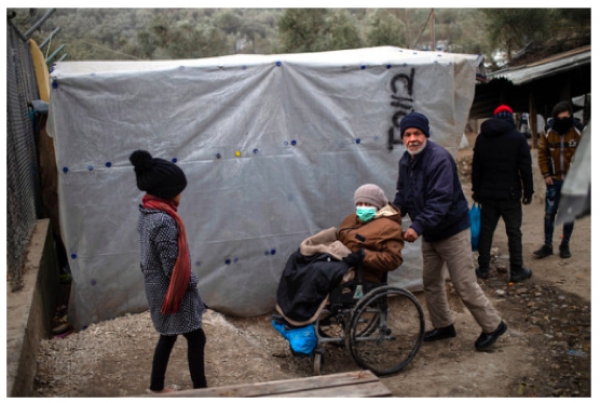Since the outbreak of a novel Coronavirus, COVID-19, was declared a Public Health Emergency of International Concern on 30 January 2020, governments and citizens have been tested in unprecedented ways. According to the UNHCR, (as of 10 March 2020) over 100 countries are reporting local transmission of COVID-19. Now officially a pandemic, this outbreak has caused the lockdown of many countries As infection rates continue to rise, an increasing number of countries has closed their external borders and introduced special measures. From Italy, France, Iran, Australia and the U.S to China, schools are closing, mass gatherings have been banned, and the global economy is in free fall.
But what does this mean for refugee and migrant populations, particularly those confined to refugee camps? How will the Coronavirus outbreak impact those cramped and unhygienic conditions, with limited access to medical care and suffering from pre-existing medical problems?
Growing fears in Greece:
News of a confirmed Coronavirus case on Lesbos sparked fears at the Moria refugee camp, as dire conditions at the camp were further aggravated by the recent events of violence and lack of medical care.
NGOs working in the camp have been ordered to limit their activities or forced to close services due to overcrowding, poor living conditions, and anger directed toward the refugee community. It is feared that both the atmosphere of fear and the additional pressure on the health system caused by COVID-19, will add to the mistrust and anger toward refugees and NGOs operating in camps.
As conflict, chaos and mass migration weaken health systems and national infrastructures, it is feared that the needs of refugee populations will not be met, especially if Coronavirus begins to spread in refugee camps. As COVID-19 spreads, it will put further strain on public health services, especially in areas already struggling to provide for large refugee populations.
As over a hundred countries have now reported locally transmitted cases of COVID-19, 34 of them have refugee populations of over 20 000. Although there are currently no available reports on the subject of the spread amidst refugee populations, prevention and precaution is key to stopping a mass outbreak.
Migrants in Italy targeted:
As Italy remains one of the worst affected countries outside China, COVID-19 is severely affecting its migrant and refugee population. As fear grows and tensions increase, some in Italy have weaponised Coronavirus for political purposes, such as to decrease the numbers of migrants applying for asylum and return asylum seekers.
Concerns grow that migrant vessels may be sent back to Libya. The UNHCR has warned that refusing rescue requests or refusing to allow migrants ashore could directly put lives at risk. As no humanitarian rescue missions have been carried out since February 27 in the Central Mediterranean, the risk of further loss of life increases.
For the migrant vessels that have made it across the Mediterranean, a mandatory quarantine period was put in place while integration services for migrants have been temporarily suspended or reduced. Even though, no cases of COVID-19 have been reported among the refugee population travelling from Libya, numerous cases of tuberculosis and other respiratory conditions have been found.
Pre-existing breathing conditions or related illnesses make people particularly vulnerable to COVID-19, and almost guarantee that if they are infected, they will require urgent care in hospital. Sergio Pintaudi, a former head of the resuscitation department at the Garibaldi Centro Hospital in the Sicilian port city of Catania, stated “the main issue for potentially sick migrants these days will be finding beds at hospitals, which are currently at a breaking point,”. “The outbreak is going to impact vulnerable and marginalised categories the most, be them Italians or migrants.”
UNHCR Statement:
The UNHCR has urged all countries with refugee populations, particularly those with large camps, to ensure that migrants and refugees are included as part of national plans to tackle the virus. In the article published on 12 March, the UNHCR reminded the world that in this interconnectivity, we must remember our most vulnerable across the globe.
As refugees and migrants often do not have access to any or adequate health services and live in unhygienic and overcrowded settlements, they are at an increased risk of exposure. Such a situation may increase the potential impact of the virus on both the local and migrant population.
The UNHCR stated that “Covid-19 is a test not only of our health-care systems and mechanisms for responding to infectious diseases, but also of our ability to work together as a community of nations in the face of a common challenge”. They continued, “When fear and uncertainty kick in, scapegoats are never far away. We have already seen anger and hostility directed at some people of east Asian origin. If left unchecked, the urge to blame and exclude may soon extend to other groups – minorities, the marginalized or anyone labelled ‘foreigner’. People on the move, including refugees, may be particularly targeted.”
They reminded all nations that Coronavirus does not discriminate, and “neither should the world when it comes to supporting those most at risk of contracting the illness.” Coordinated, decisive and compassionate action is the only way to protect our most vulnerable populations, and therefore, to protect the broader society. As COVID-19 sets an unprecedented challenge, governments and citizens must continue to support refugees and migrant populations, and include these populations in their response to the Coronavirus pandemic.
To read more, please visit:
https://www.who.int/emergencies/diseases/novel-coronavirus-2019/events-as-they-happen
https://www.nrc.no/news/2020/march/10-things-you-should-know-about-coronavirus-and-refugees/
https://www.thenewhumanitarian.org/news/2020/03/16/italy-coronavirus-migrants-asylum-seekers




